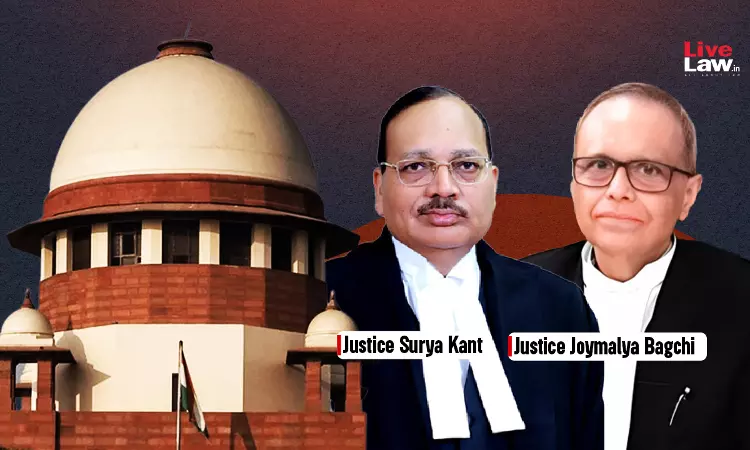- Home
- /
- Top Stories
- /
- Inclusion Of Leprosy As Ground For...
Inclusion Of Leprosy As Ground For Divorce 'Embarrassing', Says Supreme Court
Debby Jain
30 July 2025 5:57 PM IST
The Supreme Court today urged the Union of India as well as States/Union Territories to take urgent remedial action against laws, rules, regulations, etc. which are discriminatory and/or derogatory towards leprosy-affected or cured persons.A bench of Justices Surya Kant and Joymalya Bagchi was dealing with a public interest litigation initiated in 2010, where it earlier directed the States...
The Supreme Court today urged the Union of India as well as States/Union Territories to take urgent remedial action against laws, rules, regulations, etc. which are discriminatory and/or derogatory towards leprosy-affected or cured persons.
A bench of Justices Surya Kant and Joymalya Bagchi was dealing with a public interest litigation initiated in 2010, where it earlier directed the States to form a Committee to identify provisions in various laws, etc. which discriminate against leprosy-affected or cured persons, and take steps for their removal so that they conform with constitutional obligations.
Today, the Court noted that some states had filed their compliance affidavits regarding constitution of the Committees, but some remained to do the needful. As such, 2 weeks' further time was given to the non-compliant states to comply with the Court's earlier direction.
Further, Chief Secretaries of the State governments were asked to file status reports on the follow-up action taken by them pursuant to recommendations of their respective Committees.
Insofar as the National Human Rights Commission was found to have independently examined the issue, the Court ordered that the Secretary of NHRC shall furnish the details to the Court after getting approval from NHRC Chairman.
The bench also advised that the states need not wait for particular Assembly sessions to carry out necessary changes in their laws, etc. "For this purpose, a one-day session can be [called]...to eliminate these provisions...it will send a very good signal...rules and regulations, Cabinet can sit and resolve", said Justice Kant.
Sr Advocate and UP AAG Garima Prashad informed the Court that Uttar Pradesh has identified 3 laws which need to be "corrected". Likewise, a counsel appearing for Rajasthan government informed that 2 laws have been identified and requisite recommendation has been made.
In particular, the bench asked about the Union's response, which was represented by Additional Solicitor General Aishwarya Bhati. The petitioner had previously informed that 4 Central Acts were amended in 2019, but still, there were more than 100 legislations where discriminatory provisions existed. The states' figure, on the other hand, stood at 145 legislations.
"The most serious...we don't want to use the word, but how embarrassing it is...you have created a ground for taking divorce", lamented Justice Kant to ASG Bhati. Ultimately, the matter was adjourned to await the Union and states' response.
It is worthwhile to mention that in 2019, the Central Government notified the Personal Laws (Amendment) Act 2019 to remove leprosy as a ground for divorce. To this end, it amended 5 Acts: (i) the Divorce Act, 1869, (ii) the Dissolution of Muslim Marriage Act, 1939, (iii) the Special Marriage Act, 1954, (iv) the Hindu Marriage Act, 1955, and (v) the Hindu Adoptions and Maintenance Act, 1956.
Background
As per claims made in the petition by Federation of Leprosy Organization (petitioner), 'leprosy' was initially considered a dreaded disease because it was incurable, highly contagious, and infectious. During that time, there was a need to segregate the leprosy patients from society at large, and therefore, the Indian Lepers Act, 1898, was enacted to provide segregation of leprosy-affected persons.
This Act contained draconian provisions against leprosy patients, such as arrest without warrant, putting them in leprosy asylums and restraints on property or voting rights. Such persons were also not allowed to seek employment.
In a breakthrough in 1979, the Multi-Drug Therapy (MDT) was developed as a cure for leprosy at any stage. Following 1981, it was extensively used in India to completely cure leprosy.
As a result of a declaration by the World Health Organization that leprosy is fully curable and not at all contagious, the 1898 Act was repealed. In 2004, the petitioner wrote to the state governments to remove provisions discriminatory towards leprosy-affected or cured persons from their laws, orders, etc., but they continued to remain.
Appearance: Senior Advocate Vinay Garg; ASG Aishwarya Bhati; Senior Advocate and UP AAG Garima Prashad; AoRs Rashmi Nandakumar and Mayuri Raghuvanshi
Case Title: FEDERATON OF LEPY.ORGAN.(FOLO) . AND ANR. Versus UNION OF INDIA AND ORS., W.P.(C) No. 83/2010 (and connected case)
Click Here To Read/Download Order



